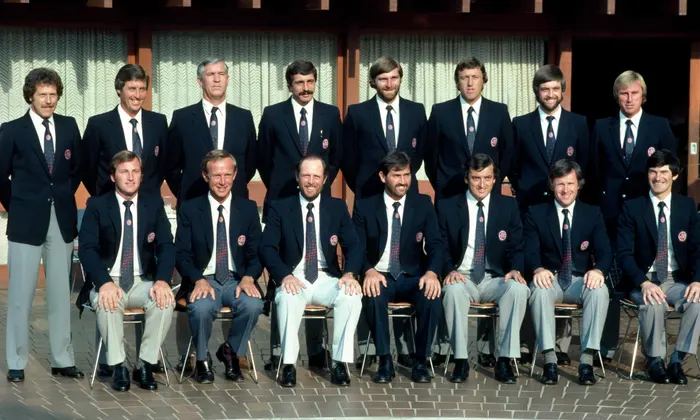Forty years ago, in the final week of February, 12 English cricketers slipped out of Heathrow, and into the eye of an international storm.
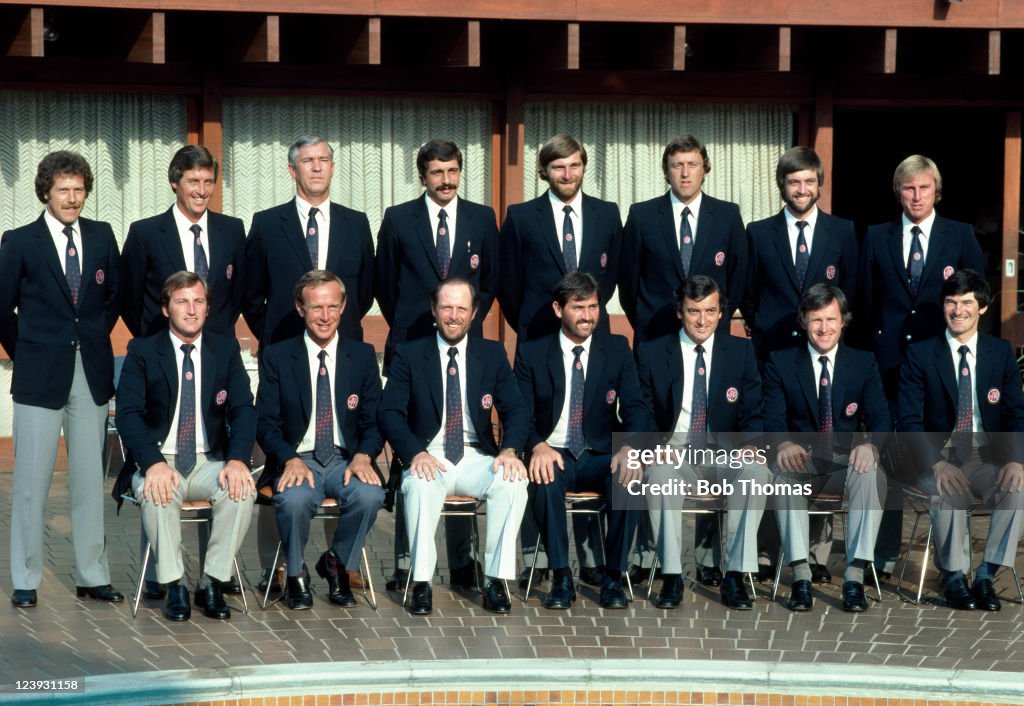
The ‘Dirty Dozen’, as the tabloids called them, included five who had returned only the previous week from England’s Test trip to India and Sri Lanka. As they embarked on a month-long rebel tour of South Africa, they stood accused in the House of Commons of ‘selling themselves for blood-covered Krugerrands’.
In petitioning for an emergency debate, Labour MP Gerald Kaufman claimed the team’s contravention of the 1977 Gleneagles Agreement – signed by Commonwealth leaders to discourage sporting links with South Africa’s apartheid regime – was ‘jeopardising this country’s place in international Test cricket, and could affect the future of both the Commonwealth and the Olympic Games’.
Conservative MP John Carlisle condemned Kaufman’s rhetoric as a ‘scurrilous attack’ on the players’ integrity, while the Speaker turned to a more pressing matter: the draft safety regulations for filament lamps in vehicles.
The indifference went well beyond Westminster. ‘I didn’t think I was doing anything wrong,’ says Graham Gooch. ‘I just took up an offer to play cricket.’ He now admits it was a ‘schoolboy error’ to accept the captaincy, ‘because then you become the focal point of the team’.
Dennis Amiss had defected to Kerry Packer’s World Series Cricket in 1977, almost losing his Warwickshire contract, and believes the South Africa trip was a minor inconvenience by comparison: ‘For me, the Packer fallout was toughest. You go in with your eyes open, and accept there will be repercussions. But we went to South Africa for what we felt were the right reasons.’
Those reasons, Amiss still insists, were broader than the financial lure of WSC. ‘There was some money in it, obviously, but I loved South Africa. It was sold to us that we were going to go around schools – black and white – and coach. So that was good, because I was not an apartheid person. I felt very sorry that the country was in the situation it was, but we played some really good cricket, and I hope we helped a country that was in turmoil.’
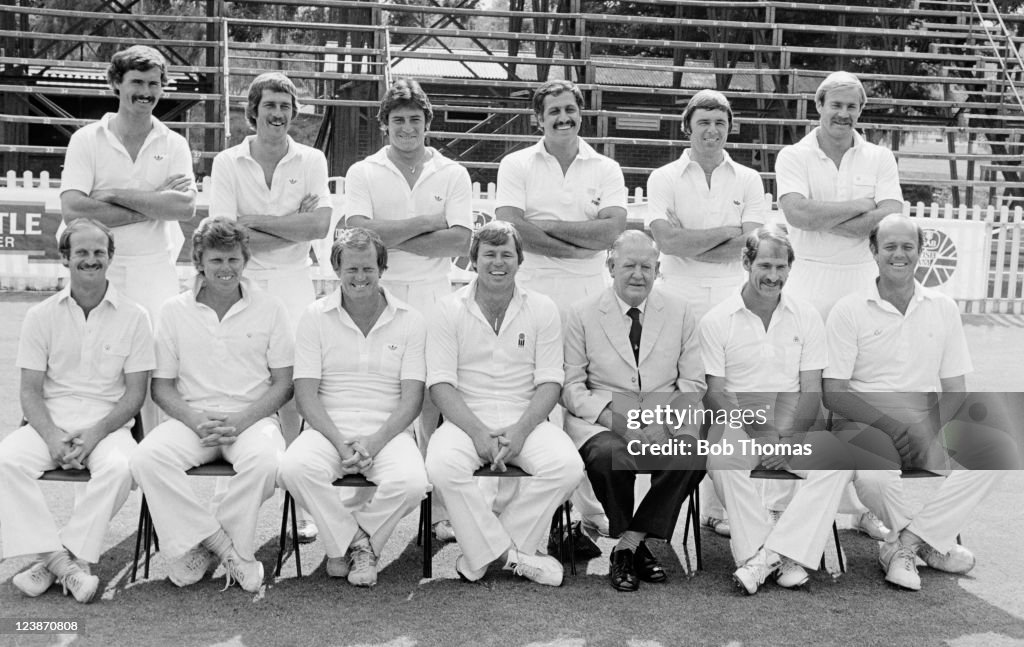
Fundamentally, though, it was the rands wot won it: South Africa’s authorities offered upwards of £45,000 for a few weeks’ work, a windfall fo players who, pre-Packer, had been earning around £200 per Test. And as Peter Willey could confirm, after being overlooked for the tour of India where much of the rebel recruitment took place, Test opportunities were often fleeting.
‘Look, the people who wrote all this ‘Dirty Dozen’ stuff… put them in the same position,’ he says. ‘You’ve got a family, and a six-month job which could end any time. Go out there for six weeks and be guaranteed two or three years’ living wage? What would they do? I have no regrets about going. You’d soon get dropped from the England set-up, or kicked out of a county side. In this world, you look after your own. I found that out.’
South Africa’s price was so right for so many that, eight years later – and in spite of the three-year international bans imposed on the original squad by the TCCB – history repeated itself. During England’s dismal 1989 Ashes campaign, word got out of a second rebel tour, planned for the following spring. The captain would be the man who had led England to victory in Australia three years earlier. ‘Do I really want to talk about that again?’ says Mike Gatting.
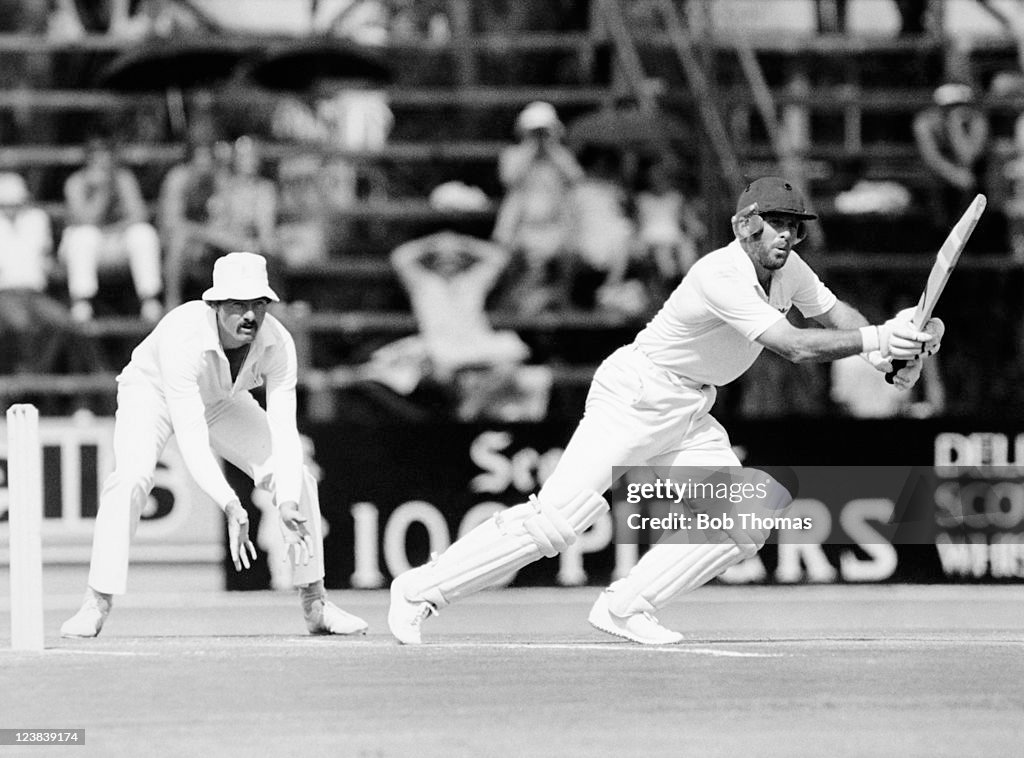
Something had shifted in the meantime, an impression confirmed by John Emburey, who alone went on both tours: ‘You look back now… was it a mistake going? In 1982, I was disenchanted, so I’d say, no, it wasn’t a mistake. Was it a mistake going on the second tour? Yes, it was. If that one hadn’t taken place, I’d be happy as Larry.’
In January 1983, almost a year after Gooch’s squad had touched down, 15 West Indian cricketers made the same journey through immigration at Jan Smuts Airport in Johannesburg. (Rebel Sri Lankans had visited in late 1982, while an Australian side would come twice in the mid-1980s.)
The reaction in the Caribbean was rather different from the British Establishment’s collective shrug. Among the politicians who lined up in condemnation was Roy Fredericks, once a Packer signatory, then a government minister in Guyana.
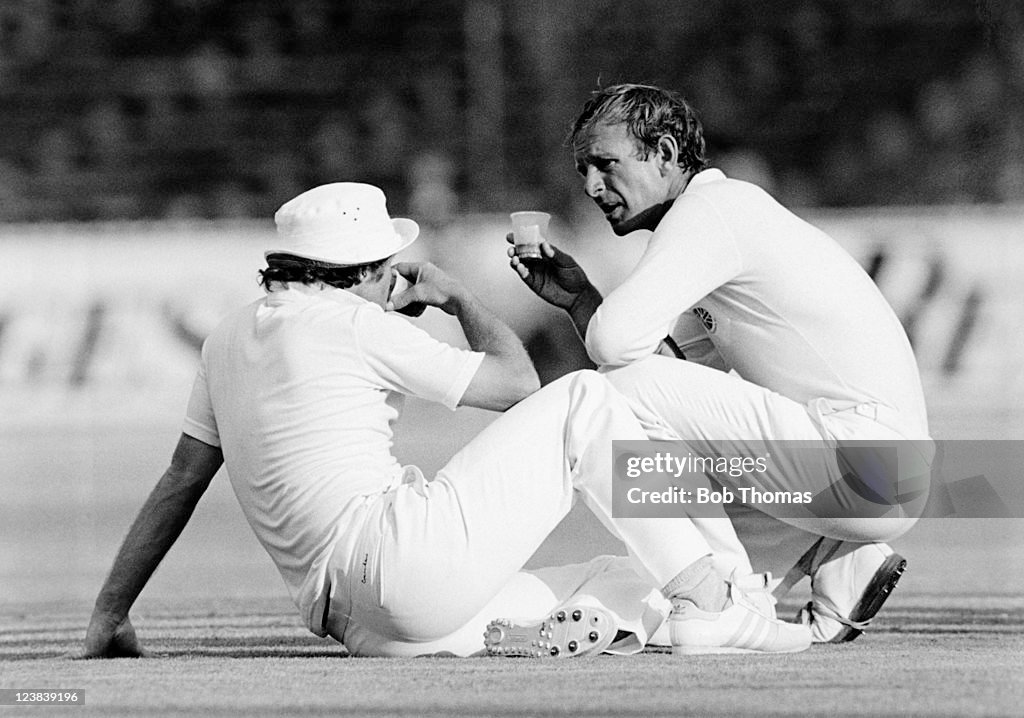
‘They should not cause further discomfort to the West Indian population by attempting to live among us,’ he declared. And so it proved. As told recently by Ashley Gray in The Unforgiven, his powerful book on those tours, the fate of those players was sealed the moment they put pens to apartheid paper; a litany of sanctions included life bans.
Lawrence Rowe, the captain and star batter whose name might otherwise sit alongside Viv Richards and Clive Lloyd, now lives in exile in Florida, unknown in his native Jamaica to anyone under the age of 50. David Murray, son of Everton Weekes, peddles drugs to tourists in Bridgetown. Richard Austin – ‘Danny Germs’ to the few who stayed in contact – died in 2015 aged 60 after decades of addiction to crack cocaine.
‘I mean, you do feel sorry for these blokes in a roundabout way when, like me, they were probably just earning a crust,’ says Willey. ‘But I haven’t lost a minute’s sleep over it. Am I allowed to say that? I don’t know what I’m allowed to say these days.’
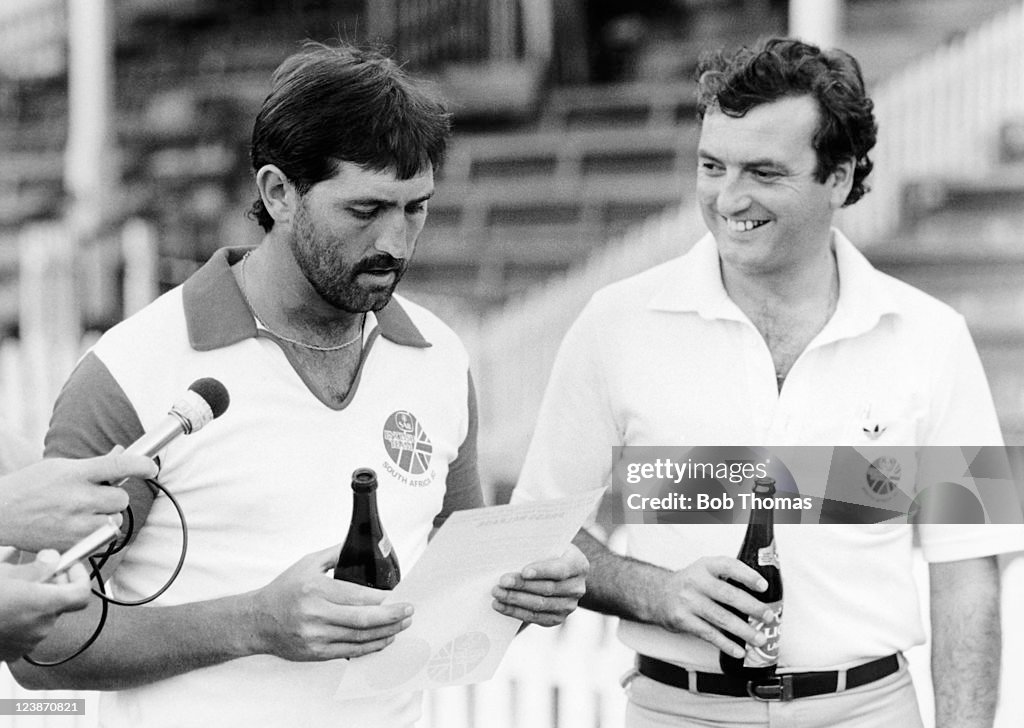
In all, 30 players spanned the two English tours. They include 12 who represented their country after the bans were lifted, of whom three made Test debuts and two became captain: Gooch and Emburey would both play their final Tests in 1995, long after turning 40. Gooch, Geoff (now Sir Geoffrey) Boycott, Alan Knott and Derek Underwood are in the ICC Hall of Fame.
Gatting and Underwood have served as MCC president. Amiss has been the ECB’s deputy chairman, and David Graveney the chairman of selectors and chief executive of the PCA. Others, notably Bob Woolmer, became international coaches. A long-time ICC match referee, Chris Broad, and a pair of Test umpires – Willey and Tim Robinson – complete a set of forgiven individuals.
Meanwhile, Everton Mattis, who was 25 and had played only four Tests, says in The Unforgiven: ‘We thought, ‘OK, we are going to get a little two- or three-year ban’. But oh boy…’ In 1987, fearing for his life in his native Jamaica, he fled to New York, where he now walks with a limp after his femur was shattered by a bullet. He dreads deportation. ‘If I could do it all over again, I wouldn’t go. I am still suffering from South Africa.’
Michael Holding’s book on race, Why We Kneel, How We Rise, excoriates the double standards: ‘There is certainly something depressing about the English reaction, as I can’t remember hearing too many apologies being issued, but maybe they see no need to apologise. All manner of cushy jobs were handed out. The arrogance, the hypocrisy, the… let me think… there must be a phrase for it? Oh yes. White privilege.’
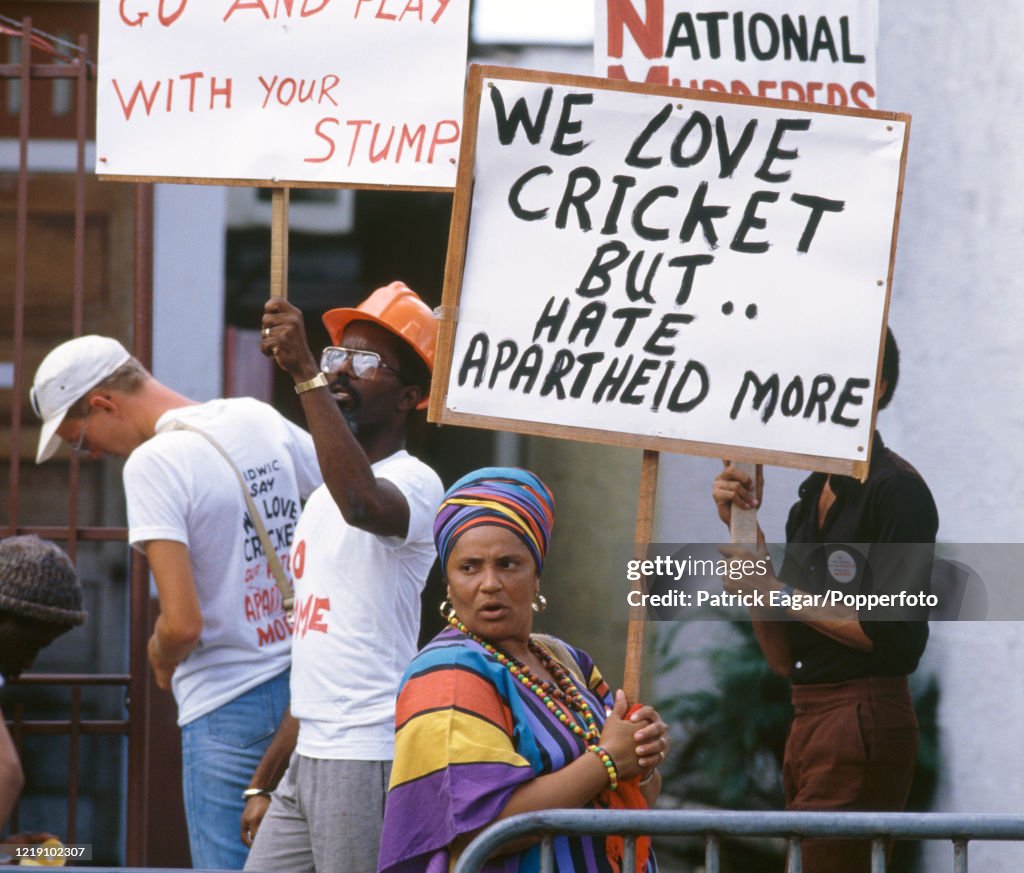
This sits uncomfortably with Graveney, player-manager on the second tour, and Gatting, who says: ‘I would hate to think Mikey thought I was racist if that’s what he’s saying.’ Graveney adds: ‘I’m very fortunate to have been involved in cricket for the whole of my adult life. If people feel I’ve been let off, that’s their view.
‘I’ve tried to serve the game to the best of my ability. Maybe in hindsight going on a rebel tour wasn’t the right thing to do. That’s the only thing I can say. I’ve often apologised when I speak at dinners – it’s often the first point I make. I let a lot of people down by going.’
Gooch, though, sees no reason to deviate from the line he has held for four decades. ‘I don’t look at that,’ he says. ‘Every board had to make their own decision. We made ours, and got banned for three years. We accepted the ban. What are you asking me? Should it be a life sentence?’ As he points out, the West Indies board rescinded the ban on their players in 1989, and one of the rebels inflicted a blow that would prove crucial during England’s tour of the Caribbean a few months later. ‘Ezra Moseley definitely came back, because he’s the one who broke my hand!’
English cricket spent much of 2021 assessing the impact of historic wrongs, but the original batch of rebels believe they were the ones hard done by. At the time, it was not an uncommon view, either. In his Notes by the Editor for Wisden 1983, John Woodcock – who had covered the tour as a strictly sporting venture for The Times – denounced the criticism as ‘hysterical’.
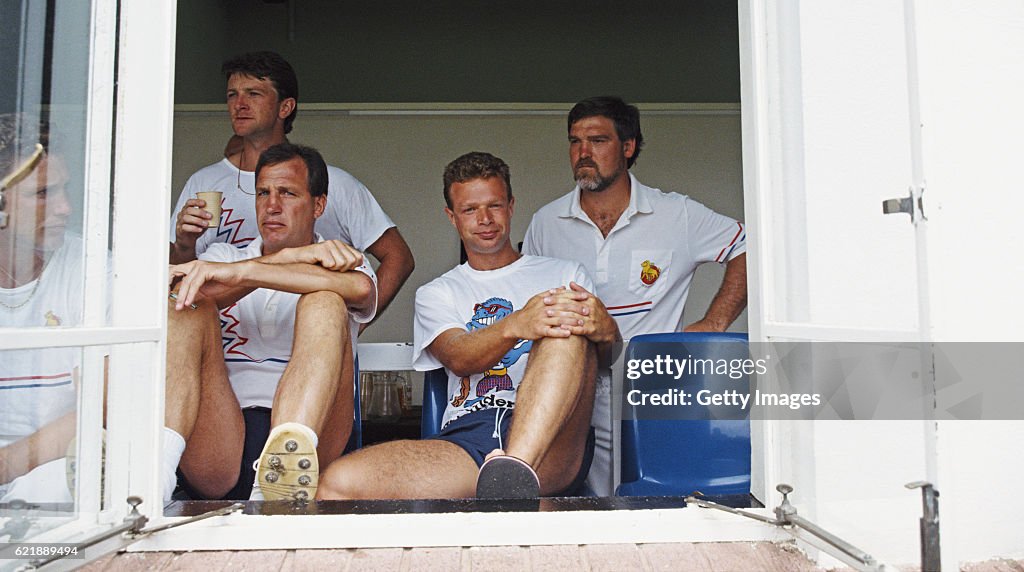
The players, he felt, had become ‘pawns in a fiercely political game’, driven by the governments of India and Pakistan, who had both threatened to cancel their 1982 tours of England unless action was taken. In late 1988, India refused visas to several England tourists, including Gooch, the captain, because of their South African connections; the trip was called off.
‘I was not wanting to play for England,’ says Gooch, who successfully sued The Sun in 1984 for claiming he no longer cared about his Test career. ‘I didn’t ever not love my country. If they had imposed the same ban on trade, then maybe they’ve got an argument. But, in politics, anything goes. We see the same things now, where human rights are concerned, with Russia and China. But we’re not going to stop buying their products. I wouldn’t say we thought as deeply as that back in 1982. That’s the reality of the situation.’
The woolly wording of the Gleneagles Agreement (what constitutes ‘sporting contacts of any significance’?) was another reason to think that the ambiguously named ‘South African Breweries XI’ could, in theory, have escaped anyone’s notice – much as Derrick Robins’s XI and the International Wanderers had provided South Africa with a glut of county tourists between 1973 and 1976.
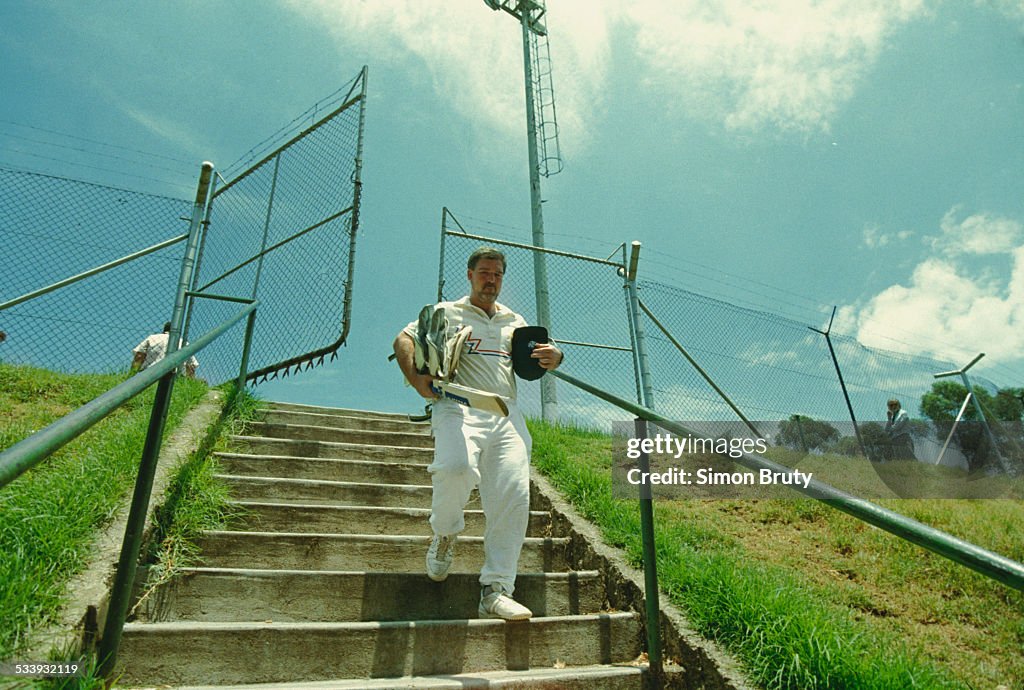
But that notion was scorched on the morning of the first match in Pretoria, when each rebel received a telegram warning of a ban. ‘We’d already started playing,’ says Emburey, ‘so that was irrelevant.’
The fact that several tourists, including Gooch, Emburey, Willey and Wayne Larkins, spent the winters of their ban playing for South African provincial sides was a further twist. Heading in the opposite direction, though, and straight into a Test debut against India – who had just threatened to cancel their visit – was England’s newest South African import, Allan Lamb. ‘It was a bit annoying,’ says Willey of his long-time Northamptonshire team-mate. ‘Somebody who was brought up in the system was allowed to play. We hadn’t upset anybody, or we didn’t think we had. So, yeah, we did feel it was odd.’
On the tour of India a month earlier, England’s prospective rebels had spoken in code – including references to chess moves – to ensure their manoeuvrings were not disclosed. Ian Botham and David Gower, England’s most marketable stars, had in principle agreed to take part, but were persuaded it would be an unwise career move; Botham’s solicitor, Alan Herd, even dashed to India to explain the issues face to face. Botham’s official reason for not going was that he would have been unable to ‘look Viv [Richards] in the eye’. Boycott dismissed this as ‘puke-making’.
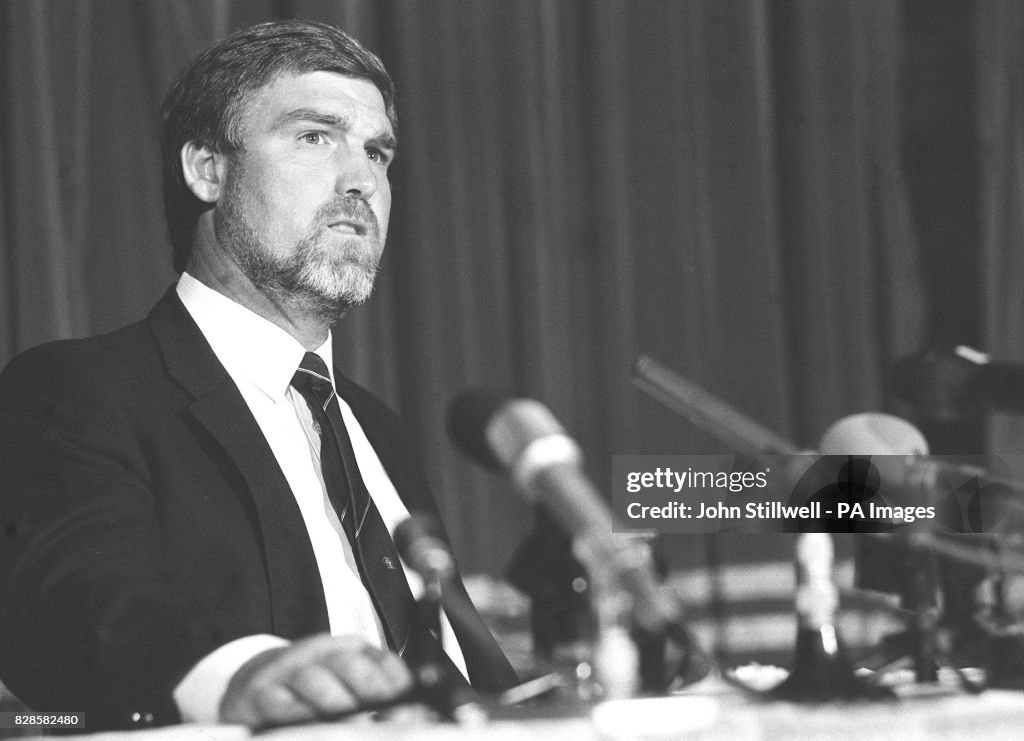
Matthew Engel, the former Wisden editor who covered the tour for The Guardian, says: ‘What the South Africans got from the major cricketing countries were the fringe players, the ageing players, and the pissed-off players, without exception. On the whole, they were all making a logical decision. It would have been absolute folly for Botham or Gower to have gone because even in those days they were making more money than the South Africans could stump up.’
The ageing process couldn’t exactly be held against the TCCB and yet, throughout the 1980s, the number of pissed-off players kept mounting, starting with a bleak tour of India, where England lost the First Test before being bored into submission during five dull draws. ‘When we made the decision, Test cricket was at a low ebb, and there was disenchantment among the players,’ says Emburey. ‘It was quite easy to accept the contract.’ Gooch agrees. ‘It’s probably the most boring tour I’ve ever been on. They were bowling nine overs an hour, with Dilip Doshi on at one end, then walking to long-off at the other.’
On August 1, 1989, the final morning of the Fourth Ashes Test at Old Trafford, news broke of the second English rebel tour. Emburey, not out overnight, was one of nine in Gatting’s rebel squad who had already played for England that summer, though only he, Neil Foster and Robinson were still in the side.
Emburey had also been the rebels’ go-between with Dr Ali Bacher, who was pulling the strings in South Africa. ‘When it broke, I was batting with Jack Russell and we managed to get a partnership going,’ he says. ‘Having gone through that before, I was a little more hardened to it, and I more or less knew what to expect. I knew we were about to be banned. But it affected Neil Foster a lot. He was crying as he ran in.’
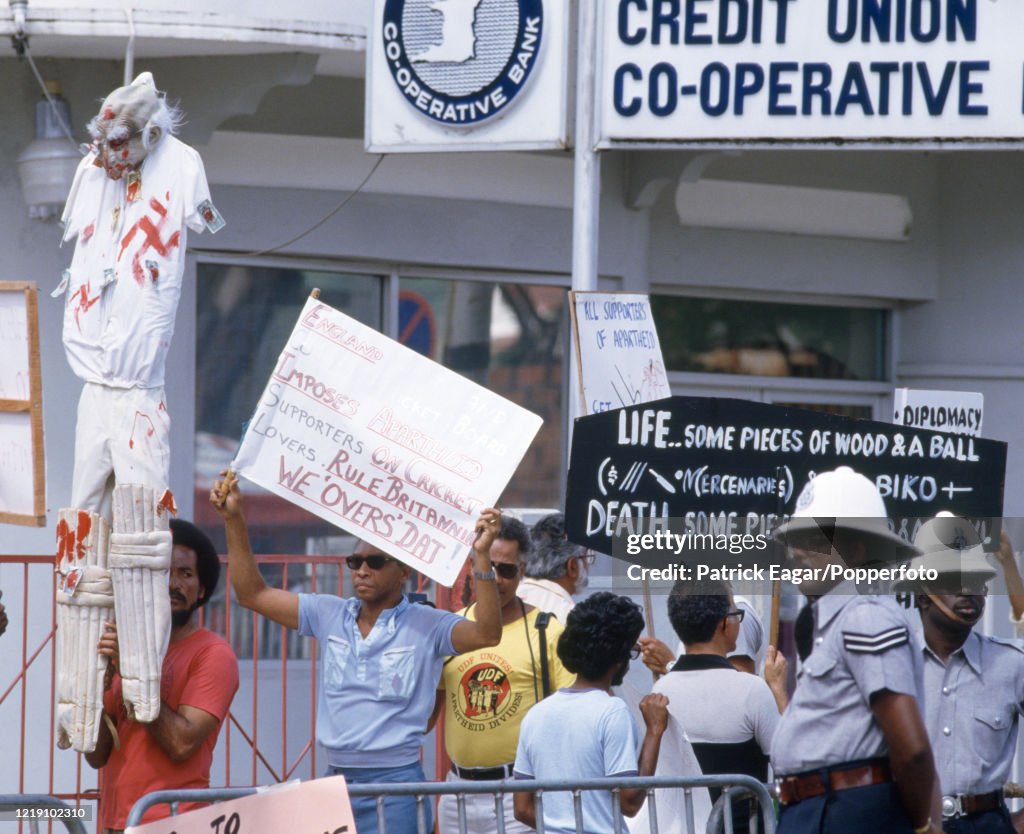
The announcement was the culmination of arguably the most shambolic two-year period in English cricket history. And it stemmed from Gatting’s row with Pakistani umpire Shakoor Rana at Faisalabad in December 1987. His sacking the following June had precipitated the season of four Test captains during a 4–0 trouncing by West Indies. Now, England chewed through 29 players in six Ashes Tests. ‘They were horrible times,’ says Gatting. ‘I hadn’t known anything about the tour. I was told: ‘This is the team, will you captain it?’ The players were totally disenchanted with the people running the game.’
Emburey shares the view. ‘That era was a shambles, a disgrace,’ he says.
‘You can understand why the side performed poorly. You’d turn up at a pre-Test dinner in 1988, and the chairman of selectors would repeat the same speech for the first three or four matches against West Indies: ‘You’re the best 11 in the country. Go out and play.’ We picked 28 that summer!’
Among them was Phil DeFreitas, who had featured in the first four Tests of the 1986-87 Ashes as a 20-year-old, but had been dropped after eight of his next nine appearances, including the first Test of the 1989 summer. When he failed to regain his place in the next three, a meeting with Bacher at a Manchester railway station led to him becoming one of two black players in the rebel party, alongside Middlesex’s Roland Butcher. After feeling the full heat of the backlash, both withdrew.
‘I was a young lad, very naive, and I signed up through anger, to have a go at the system for treating me this way, because I felt England were messing me around,’ says DeFreitas. ‘Not because, deep down, I wanted to go. It was the disappointment of being dropped all the time. There was a horrible reaction towards me. But I was never going to go – and I didn’t.’
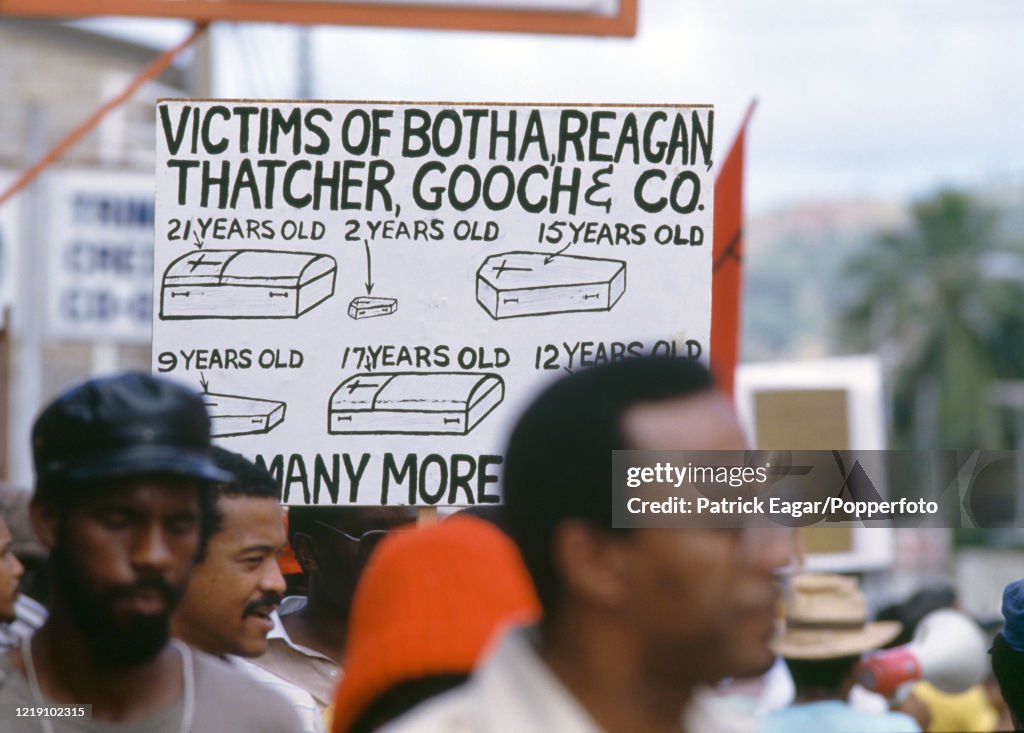
Butcher, whose entire Test career took place in the winter of 1980-81, was 36 when South Africa came calling. But he knew his reputation might never recover: ‘There’s no forgiveness in the Caribbean. Two black guys going to South Africa would have been seen as selling out – two guys not in tune with their African brothers. So it was natural for both black and white to identify us as the ones to pick out. They wouldn’t pick out Embers and Gatt for those reasons.’
Had DeFreitas and Butcher travelled to South Africa, they would – like their West Indies forebears – have had to accept ‘honorary white’ status to obtain the same privileges their team-mates would have taken for granted. ‘It would have been a coup for South Africa if they had got one of the black players to visit,’ says Emburey. ‘It would have been the first multiracial rebel team.’
DeFreitas is sure his card would have been marked for ever had he gone – unlike so many England rebels, Emburey included, who strolled back into the system after their bans. ‘Everything I fought for, and everything about how I wanted to be as a professional cricketer… I would have just thrown it away,’ says DeFreitas.
As it transpired, the 1990 tour – which coincided with the release of Nelson Mandela and the legalisation of protests that, at Pietermaritzburg, led Bacher to fear Gatting would be killed – meant the rebels returned with their preconceptions transformed. ‘It was the magnitude of the events,’ says Graveney. ‘I’ve been involved in the selection of England teams, and the immediate tension that creates. But this was a world event, and it had media interest way beyond anything I’d encountered. That made a vast impression.’
As with many others, Graveney admits his involvement fractured several close relationships, including one within his own family that would never be resolved. But it is an encounter in the Gloucestershire dressing-room that still sits most awkwardly with him.
‘Courtney Walsh was a team-mate, and is still a friend. But once the team had been declared, there was an interesting conversation with him. I think he would have wanted me, as a friend, to explain why I was going, before it got in the public domain. As he put it: ‘At least Lawrence Rowe had the courtesy to tell me.’ I failed, which was completely insensitive of me. We all have regrets. That’s probably one of my biggest.’
And what of Gatting? ‘At the end of the day, you make decisions in your life, and it’s history,’ he says. ‘There’s nothing you can do about it once it’s been done. Sometimes you make good decisions, sometimes you make bad decisions. To be perfectly honest, it was probably a mistake to go on that trip.’
Note: This article is written by Andrew Miller and has been published at Daily Mail UK
